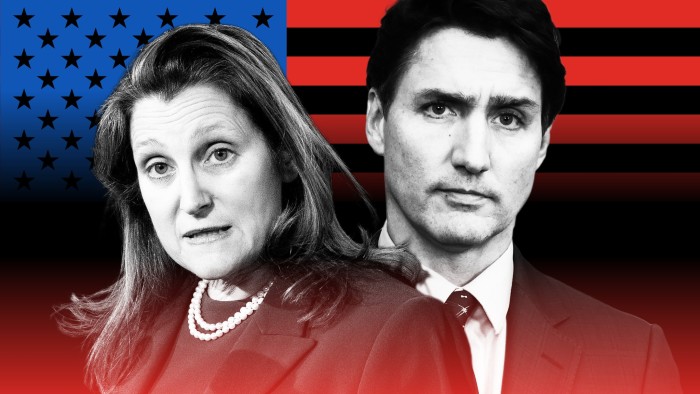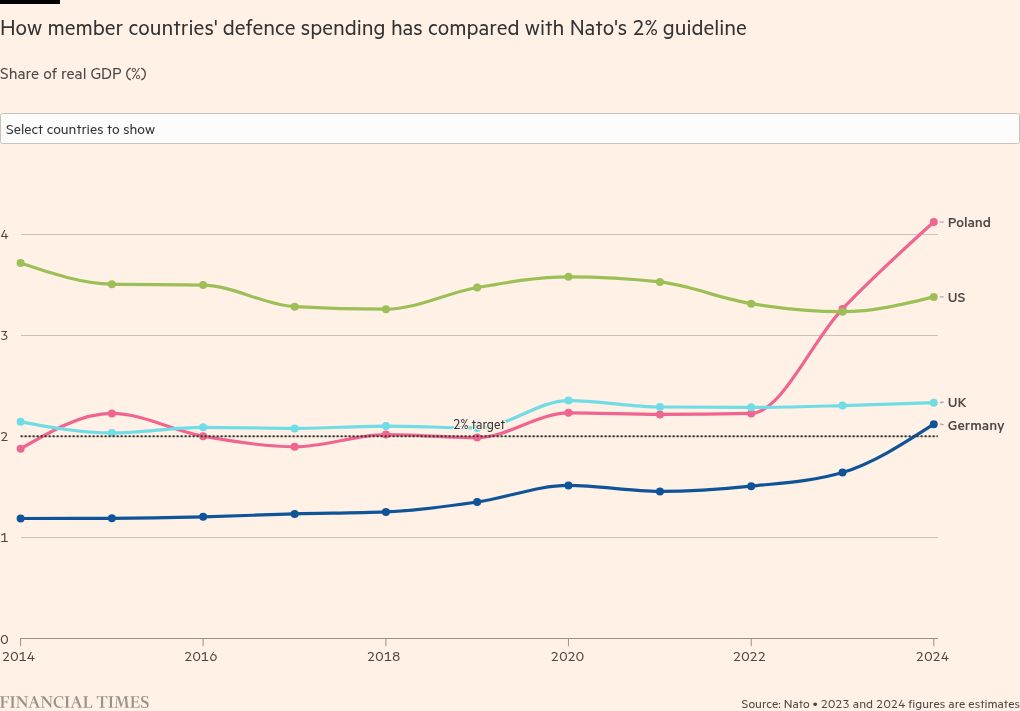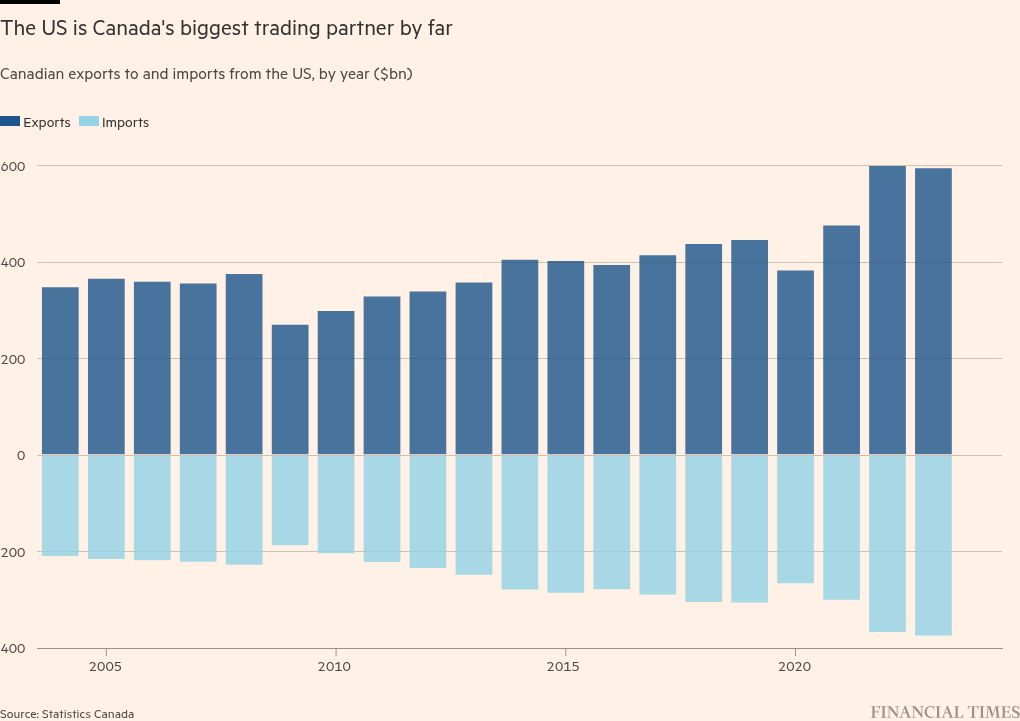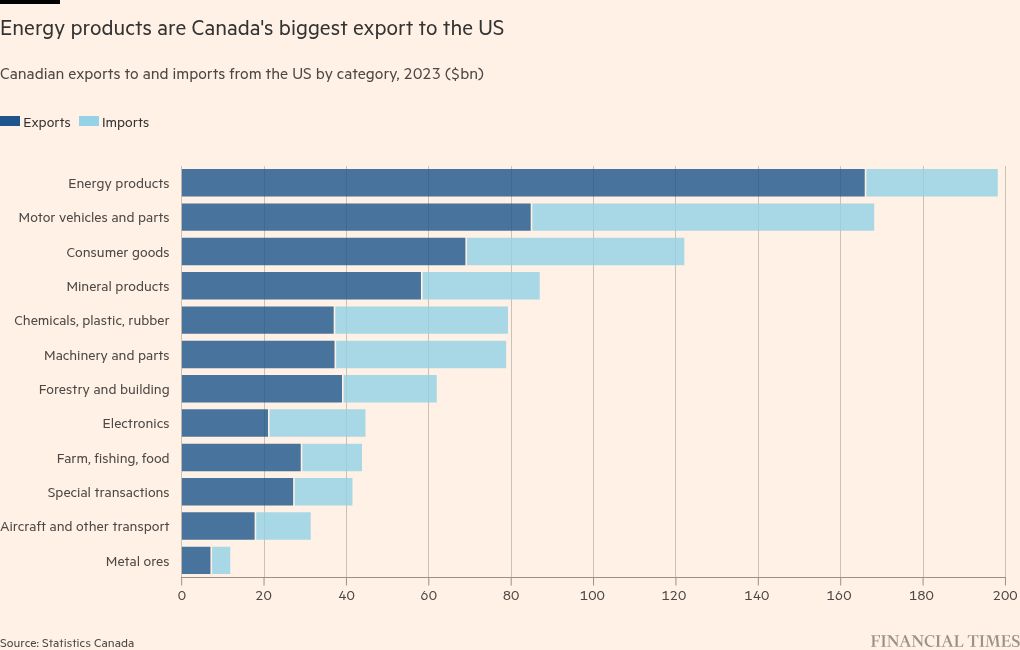
Donald Trump’s emphatic victory in the US presidential election has caused jitters north of the border in Canada, a close ally with a trading partnership worth about $1.3tn a year.
In his congratulatory message to the president-elect, Prime Minister Justin Trudeau reminded Washington that Canada and the US have “the world’s most successful partnership” and that they “are also each other’s largest trade partners and our economies are deeply intertwined”.
Meanwhile Chrystia Freeland, the finance minister, told reporters in Ottawa that while there were a “lot of anxieties” after Trump’s victory, “Canada will be absolutely fine”.
Ottawa had first-hand experience of Trump’s “America First” trade policy during his previous administration. In 2017 the former president insisted on renegotiating the two-decade old North American Free Trade Agreement, which he described as a “disaster” that, along with China, had hollowed out the US manufacturing sector.
Trump also accused Trudeau of being “two-faced” during tense 2019 talks on Nato defence spending, with Canada’s contributions to the alliance still below the minimum of 2 per cent of GDP.
Canadian defence spending is likely to remain a sticking point. Mélanie Joly, minister of foreign affairs, said on Wednesday that Canada would be tripling its defence budget. “We want to strengthen the Nato alliance, and Canada will continue to contribute,” she said.
But Trudeau told a Nato summit in July that the 2 per cent target would not be reached until 2032.

Agriculture is another area that caused problems between the two neighbours. Trump railed against Canadian protections on dairy products during his presidency, tweeting in 2018: “Canada charges the US a 270% tariff on Dairy Products! . . . Not fair to our farmers!”
Canada’s Digital Services Tax Act, which places a 3 per cent tax on global technology companies, mostly based in the US, could also be an area of concern in the upcoming Trump administration.
Canadian officials are keen to play down any possible friction, pointing out that the two countries along with Mexico signed the US-Mexico-Canada Agreement, which replaced Nafta, during Trump’s last term.
“Our trading relationship today is governed by the trade deal concluded by President Trump himself and his team. That’s really, really important,” Freedland said this week.
She and other officials have also been meeting US counterparts throughout the year to bolster trade continuity. Candace Laing, president of the Canadian Chamber of Commerce, on Wednesday issued a statement pointing out that the two countries share “an impressive $3.6bn in daily trade” and “tariffs and trade barriers that will only raise prices and hurt consumers in both countries”.
Goldy Hyder, president of the Business Council of Canada, said Trump’s strong mandate offers Canada opportunities. “We can enhance energy security, drive economic growth, boost shared prosperity and establish ourselves as the global standard for innovation and economic co-operation,” he said.
But there is nervousness in Ottawa. Trump has threatened to impose duties of 10-20 per cent on imports from all trading partners. With the USMCA agreement up for review in 2026, it could be subject to change under his presidency.
Trudeau on Thursday re-established the cabinet committee on Canada-US relations to focus on “critical” bilateral issues. After its first meeting on Friday, Freedland, its chair, said the group would meet “often and early next week”, and added that Trump and his pick for trade representative, Robert Lighthizer, have described USMCA as a “model trade deal and I agree with them”.
“We know our trading relation is strong and mutually beneficial . . . We are the most important export market for the US by a long shot,” she said.

If Trump were to impose his proposed 10 per cent blanket tariffs, it would hit about one-tenth of US imports from Canada between 2026 and 2027, said Tony Stillo, Canadian director of the Oxford Economics think-tank.
“A second Trump presidency will likely also lead to greater global uncertainty so it will be important to expect the unexpected, particularly when it comes to tariffs,” he warned.
Stillo added that if tariffs were imposed, Canada would likely respond with proportional retaliatory and, in some cases, targeted levies that would hit Republican state governors as a way to put pressure on Trump.
Government officials are meanwhile keen to highlight areas in which the US and Canada are co-operating, such as on China.
François-Philippe Champagne, minister of innovation, science and industry, said Canada was now more “strategically integrated” with the US on critical minerals, the cross-border automotive industry and green energy supply chains.
“Everyone [in Washington] is talking about security, that is the paramount topic. [Also] supply chain resiliency — they understand that we are their key strategic partner,” he said.
This week Ottawa ordered Chinese-owned social media company TikTok to close its Canadian office based on “national security grounds” and “advice from partners”, Champagne added.
The Trump presidency is also good news for Canada’s oil and gas sector, which sends most of its products to the US.

“Energy is the cornerstone of our trade relationship. That just got truer,” said Heather Exner-Pirot, a policy director at the Macdonald-Laurier Institute, an Ottawa-based think-tank.
After US President Joe Biden scrapped the $8bn Keystone XL pipeline in June 2021, maintaining an integrated North American energy system and bidirectional energy flows “is increasingly in focus”, said a spokesperson for Enbridge, a Calgary-based multinational pipeline and energy company.
Ultimately, Canada’s relations with its more powerful neighbour would depend on Trump’s approach to the rule of law, said Errol Mendes, professor of law at Ottawa university.
“If it turns out to be a shift towards autocracy, Canada is in very deep trouble on trade, international security, migration and social conflict internally and externally,” he warned.